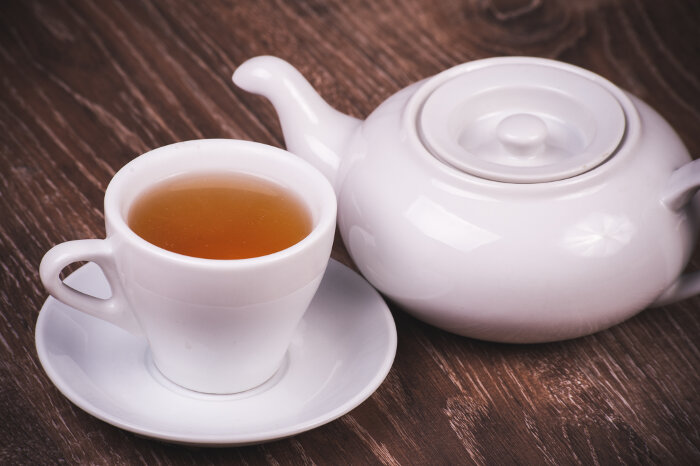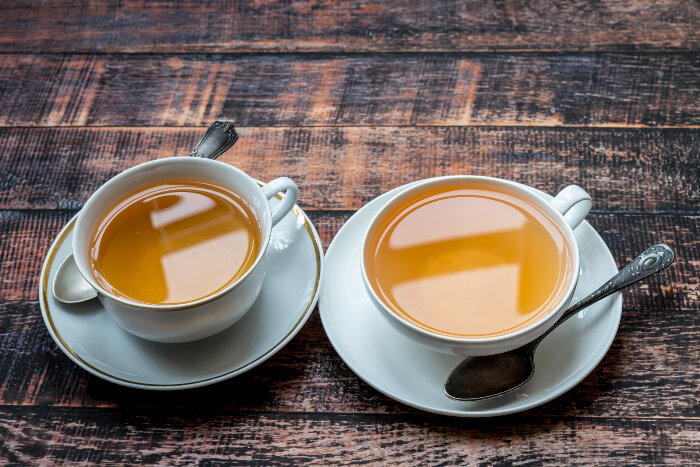Ginseng Tea: Benefits, Side Effects, Uses

Ginseng tea is a natural, herbal supplement to boost your mental and physical health. Although research on some of the benefits is limited, Ginseng tea continues to be used by many to support health and wellbeing. Three types Ginseng are available: American, Korean and Siberian. Siberian Ginseng does not come from the same root source as American and Korean, but it does provide health-boosting benefits.
What is Ginseng Tea?
Ginseng is a perennial plant with fleshy roots. The roots are light colored and fork-shaped, which may resemble the outline of a person. The plant consists of a long stalk with oval-shaped leaves. Ginseng tea is made from a chopped up Ginseng root. Korean ginseng is labeled by three different types and these labels correspond with how the herb is processed:
- Fresh Ginseng is less than four years old
- White Ginseng is four to six years old and is dry-processed
- Red Ginseng is six years old and is steamed and then dried
The White Ginseng is peeled before it is processed, but Red Ginseng is not. What is also different about Red Ginseng is that during the steaming process, the starch forms a gelatin which increases the saponin content of the herb. One of the strong, active components in Red Ginseng are the Ginsenosides which are thought to help improve erectile dysfunction according to the October 2008 edition of the British Journal of Clinical Pharmacology.
What Is Ginseng Tea Good For?
Ginseng has been used medicinally for thousands of years for its adaptogen compounds. These compounds boost the body’s ability to heal itself and to restore balance. When a body is in balance, health increases, you feel energetic and your immunity improves to help prevent future illnesses. Ginseng tea has many natural benefits such as:
- Boosting mental clarity
- Improving diabetes
- Reducing complications from erectile dysfunction
- Lessening the duration of a cold, or your chances of getting sick
- Prevents fatigue
- Lowers cholesterol
- Reduces inflammation
- Lowers the risk of cancer
- Helping overcome the herpes type II virus- Siberian Ginseng
A study presented in the September, 2015 edition of International Journal of Food Sciences and Nutrition, promotes American Ginseng as a protector of cellular DNA. The study found that within two hours of drinking a cup of American Ginseng tea, subjects cells showed less damage from ultraviolet B irradiation than the cells of those used as test subjects.

Are There Any Side Effects From Ginseng Tea?
Ginseng is a natural, herbal supplement, but some products may contain harmful additives. It is always best to speak with your physician before beginning any herbal supplement program. Certain people have an allergic reaction to the herb which includes dizziness, a rash with or without itching, swelling of the mouth, and/or difficulty breathing. Some potential side effects of Ginseng tea include:
- Constipation
- Menstrual concerns such as breakthrough bleeding and breast tenderness
- Dizziness
- Stomach upset
- Headache
- Insomnia
- Irritability
- Fast heart rate
- Blood pressure changes- either an increase or decrease
- Mood changes, fatigue or nervousness may occur with Siberian Ginseng
Ginseng should not be mixed with certain medications that are used to control:
- Blood pressure
- Heart rate
- Diabetes
- Blood clotting
- Mental concerns such as depression and anxiety
- Immune system disorders
- Estrogen-related disorders such as endometriosis and fibroids
If you feel you have consumed an excessive amount of Ginseng tea, look for increased symptoms such as:
- Blurred vision
- Swelling
- Diarrhea
- Dry mouth
- Vomiting
- Seizures
- Feeling delirious
How to Make Ginseng Tea
If you have purchased pre-made Ginseng tea, follow the preparation directions on the package. Be mindful of the duration of your use, since the active properties can disrupt your sleep patterns. Speak with your physician, but as a general guideline, limit the use of American Ginseng for one month, Siberian Ginseng for two months and Korean Ginseng for three months consecutively. Avoid excessive intake of caffeine while consuming Ginseng Tea since both products are a stimulant. If preparing your own tea from dried Ginseng:
- Use 1 tsp of Ginseng powder per cup of tea
- Place the powder in a mug and add other herbs to enhance the flavor
- Add hot water to the mug, but avoid adding boiling water
- Let the tea steep for five minutes and then cool to your liking
- Add sweeteners such as honey or sugar if desired
- Refill the mug two or three times as needed
